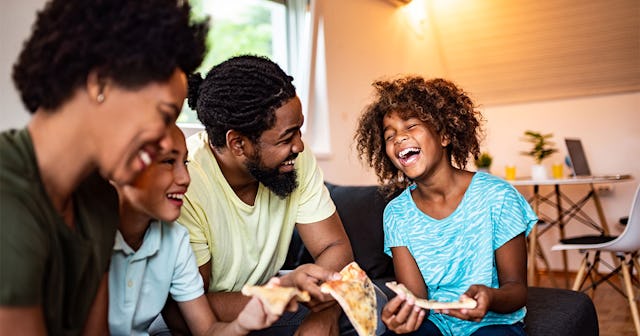We Don't Do Family Dinners — Here's What We Do Instead

You don’t have to look far to find a parenting expert touting the benefits of family dinners. They tell us that coming together around the dinner table each night can help our kids do better in school, improve mental health, and reduce risks of depression, eating disorders, and substance abuse.
The glow of family dinners – the shiny, happy family gathering around a table, talking, laughing, and sharing news about their day – is so prevalent, that I spent a lot of years trying to make them happen. And I spent a lot of time feeling like a failure because we just could not make it happen.
That is, until I realized that the family dinner mandate is grounded in unrealistic ideals that don’t make sense for a lot of families, including my own. Recently, I’ve shed the guilt and leaned in – way in – to our anti-family dinner routine.
Instead of gathering around the table, we commit the cardinal sin of dinnertime – we grab our plates and sit on the couch in front of the TV. Gasp!
Here’s why: It works for us.
We started this new family dinner routine in the early days of the pandemic. With everything else topsy-turvy, and our dinner table serving as a classroom/office desk, why try to make dinner-table meals happen? Instead, we loaded up our plates and settled into the couch for some good ol’ fashioned TV-binging.
Proponents of the “distraction-free family dinner” philosophy suggest that it doesn’t provide for connection in the same way a more traditional family dinnertime does; I say nonsense. For my family, dinners around the TV actually brought us closer and enabled connection. My kids are older – one teen and one almost-teen – so we finally like the same kinds of TV shows. This end-of-the-day dinnertime binge gave us all something to look forward amidst the stress of the pandemic.
Our pandemic-induced dinnertime routine is still going strong, and it hasn’t just given us something to look forward to each day, but it has helped us connect in new and enjoyable ways. In the past couple years, we’ve watched shows like Friday Night Lights and New Girl, Never Have I Ever and The Office, Outer Banks and Ted Lasso. Because of our dinnertime routine, we have new jokes to share, complex plot lines to discuss, and conversation-starters about important things like sex, racism, and drinking alcohol.
There are plenty of reasons that traditional family dinners don’t work for families. Some parents work nights. Some kids have evening sports practices or music lessons. And some families just don’t like to sit around the table with forced conversation. To each their own.
When it comes to all the benefits that family dinner proponents tout – things like better grades and self-esteem, lower risk of teen pregnancy and substance abuse – I don’t think there is a one-size-fits-all approach. It doesn’t matter whether a family sits down tother around a table at the end of the day; what matters is that a family is connecting. That we are talking to our kids, especially our teens, in a way that feels comfortable for them (and for us). That we are facilitating a strong relationship with them so that they can come to us when stuff gets real.
So much of parenting has become about what we should be doing to raise successful and happy kids, but much less is said about the importance of simply enjoying our time with them. I am less interested in forcing family dinners — even if it means my kids’ grades are more likely to improve — and more interested in doing dinner around the TV if it means we have a close relationship and enjoy our time together. After all, isn’t that the ultimate goal?
This article was originally published on